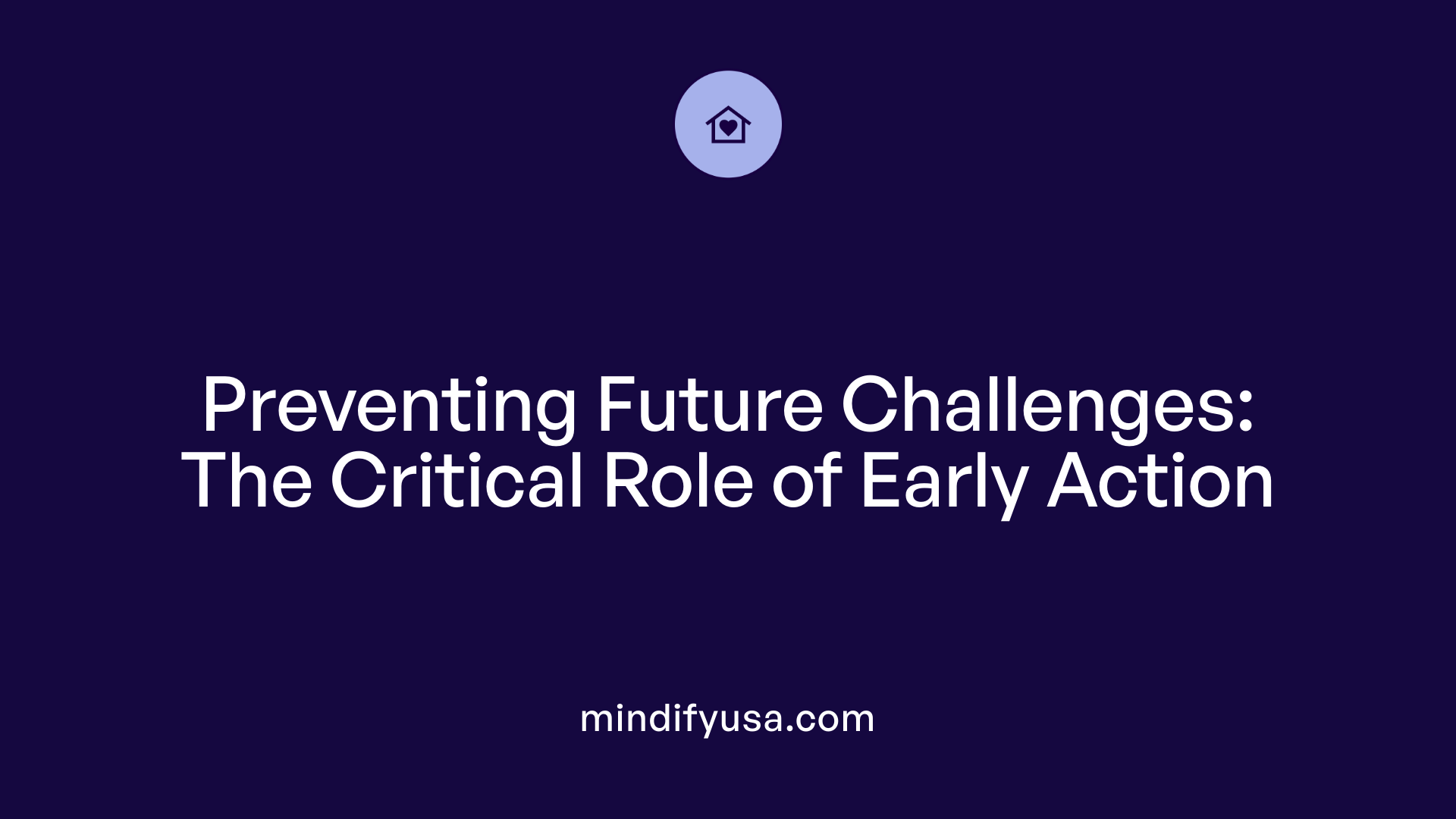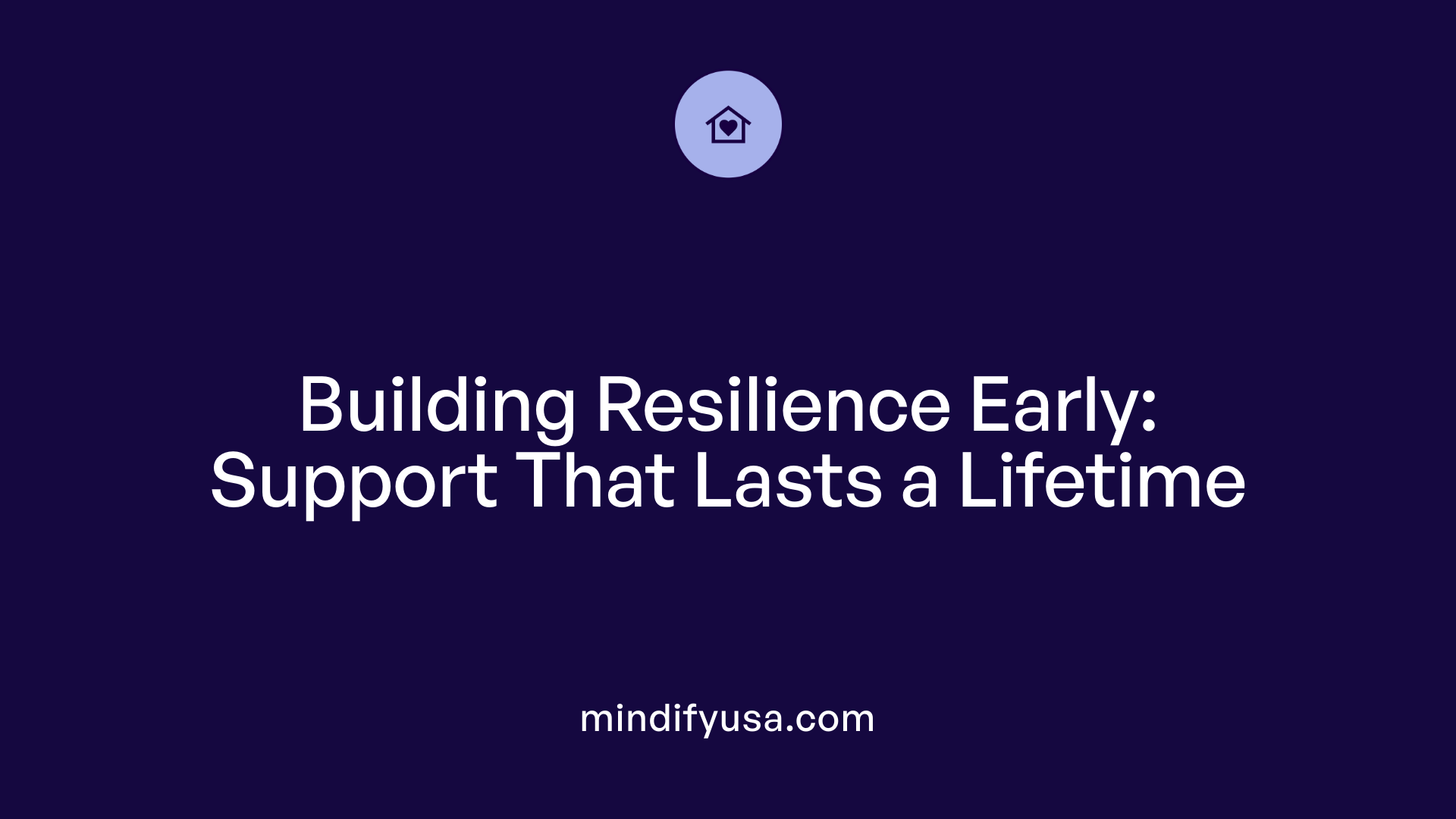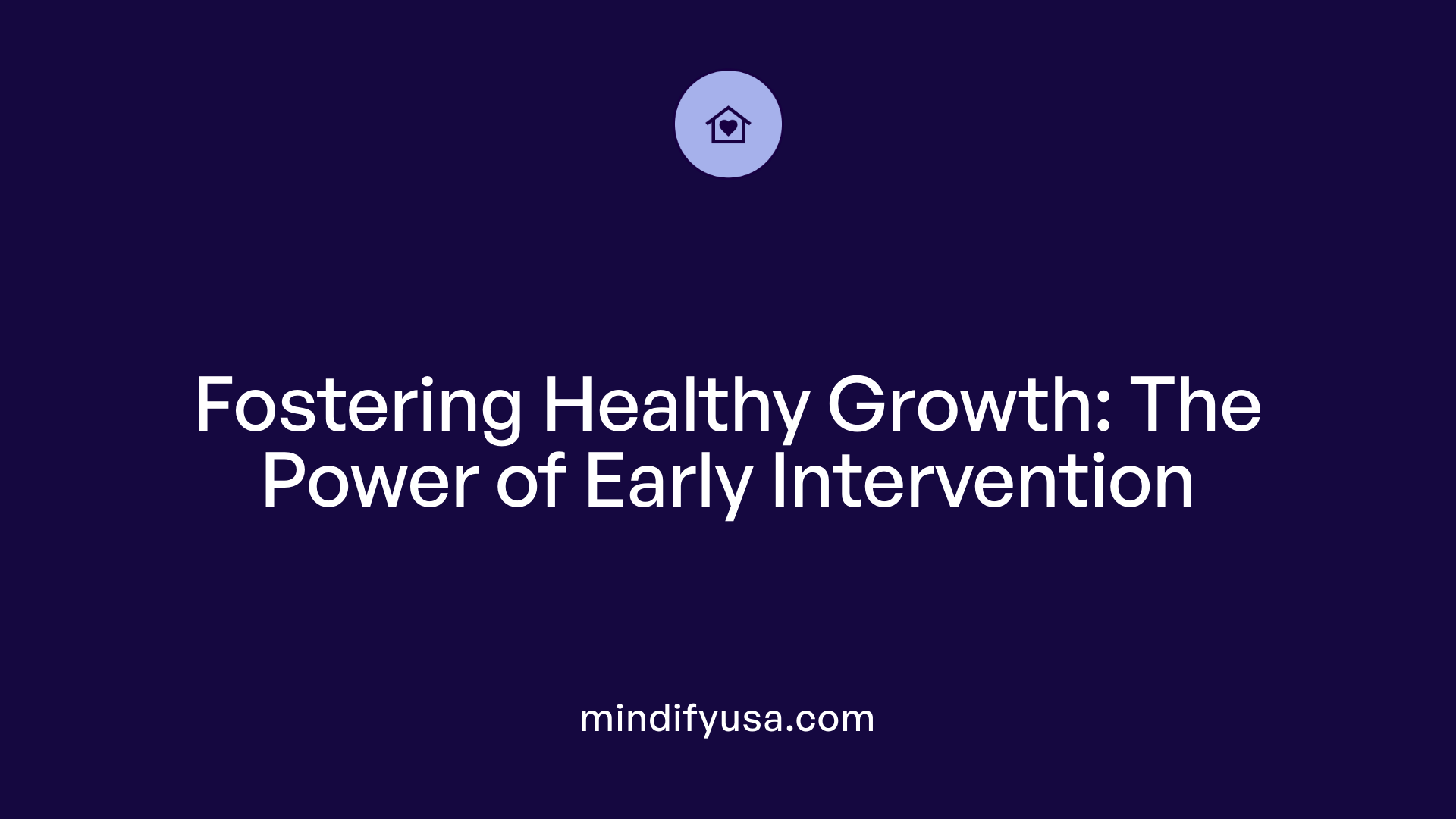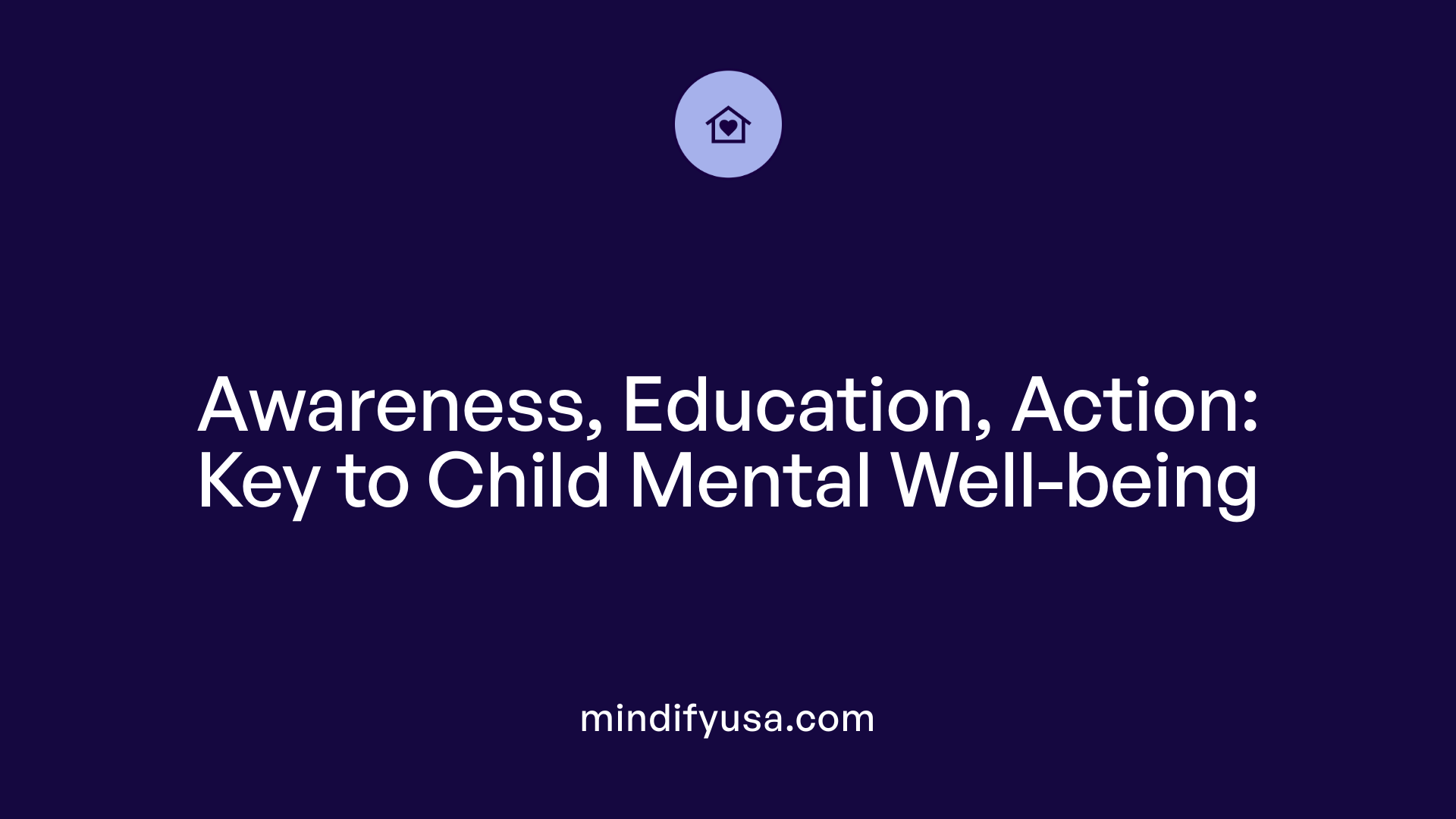Understanding the significance of early mental health support in children
Early intervention in children’s mental health is essential for fostering healthy development, preventing future psychiatric conditions, and ensuring better long-term outcomes. Recognizing and addressing mental health concerns during childhood, especially before age 14, sets the foundation for resilience, emotional well-being, and social functioning that can last a lifetime.
The Critical Role of Early Intervention in Preventing Long-Term Mental Health Challenges

What is the importance of early intervention in children's mental health?
Early intervention in children's mental health plays a crucial role in shaping their long-term well-being. Since half of all mental health problems start by age 14, detecting issues early can significantly alter their developmental trajectory. When mental health problems are identified promptly, children can access effective, evidence-based treatments that reduce symptoms and support their social and emotional growth.
Addressing these challenges early decreases the risk of the problems worsening over time and helps prevent secondary complications like substance abuse, self-harm, or additional mental health conditions. It also supports academic success, healthy relationships, and emotional resilience.
Furthermore, early mental health care eases emotional and financial burdens on families by providing support before issues escalate into crises. It creates a nurturing environment where children can develop essential coping skills, self-esteem, and healthy stress management techniques.
By prioritizing early detection and intervention, we foster healthier individuals and build stronger, more supportive communities. Investing in these early efforts is not only cost-effective but also results in better health outcomes, reduced societal costs, and a brighter future for children and adolescents.
Benefits of Early Mental Health Support in Childhood Development

What are the benefits of providing mental health support to children early in life?
Offering mental health support at a young age is essential for setting a positive foundation for a child's ongoing emotional, social, and cognitive growth. Early intervention not only helps prevent mental health conditions from worsening but also encourages the development of resilience and healthy coping mechanisms. Children who receive support early tend to develop better emotional intelligence, problem-solving skills, and stress management abilities, all of which foster overall well-being.
By nurturing mental health during childhood, children can form healthier relationships, perform better academically, and navigate social challenges more effectively. This proactive approach reduces their risk of developing long-term mental health issues, such as anxiety or depression, later in life. The investment in early mental health services also diminishes future societal costs like substance abuse or juvenile justice involvement.
In addition, early support enhances a child's ability to deal with adversity, boosting confidence and independence. Families and caregivers play a critical role in providing responsive care, which complements professional services in creating a supportive environment.
Ultimately, promoting mental well-being during childhood leads to healthier adults, with higher chances of engaging positively in society, maintaining good relationships, and leading productive lives.
Improving emotional and social skills
Early mental health programs focus on social-emotional learning, helping children understand and manage emotions, develop empathy, and build positive interpersonal skills. Such skills are vital for forming healthy relationships and reducing behavioral problems.
Reducing future mental health risks
By addressing mental health concerns early, interventions decrease the likelihood of future issues such as chronic anxiety, depression, or behavioral disorders. They also prevent secondary problems like substance misuse or self-harm.
Promotion of resilience and coping skills
Supportive early interventions teach children how to cope with stress, setbacks, and adverse situations, fostering resilience. This emotional strength supports them throughout life, enhancing their ability to bounce back from difficulties.
| Aspect | Benefits | Additional Notes |
|---|---|---|
| Emotional skills | Better emotional regulation | Reduces aggressive behavior, promotes empathy |
| Social skills | Improved peer relationships | Facilitates teamwork and communication |
| Risk reduction | Lowered incidence of disorders | Prevents escalation of issues in adolescence and adulthood |
| Resilience and coping | Increased stress management | Promotes mental toughness and adaptability |
| Academic and social success | Enhanced performance | Correlates with improved concentration and motivation |
By investing in early childhood mental health, society gains healthier, more resilient individuals who are better equipped to face life's challenges and contribute positively to their communities.
How Early Intervention Fosters Healthy Development and Long-Term Well-Being

How does early intervention promote healthy development and well-being in children?
Early intervention plays a vital role in nurturing children's health and development by addressing challenges at the earliest possible stage. It involves identifying issues related to emotional, behavioral, or developmental delays before they escalate into more serious problems. By doing so, children receive tailored support that targets their unique needs across multiple domains, including physical growth, cognitive skills, social-emotional competence, and communication.
Services are often delivered in natural settings such as homes and daycare centers to ensure comfort and consistency. This family-centered approach encourages active participation from parents and caregivers, empowering them with strategies to support their child's growth. These programs focus on reducing risk factors — such as neglect, exposure to trauma, or developmental delays — while boosting protective elements like resilience and confidence.
Interventions aim to help children meet developmental milestones, like language skills, emotional regulation, and social interactions. When implemented early, they foster a child's ability to form healthy relationships, succeed academically, and cope with life's challenges. Overall, timely and appropriate support during sensitive developmental periods helps children unlock their full potential, setting the stage for healthier, happier futures.
Supporting developmental milestones
Supporting children to reach key developmental goals involves targeted activities designed to improve their social, emotional, physical, and cognitive skills. For example, programs like behavioral and cognitive-behavioral therapy are effective in reducing symptoms of anxiety, externalizing behaviors, and other mental health issues, especially in children aged 4–9. These early supports help children develop better problem-solving, stress management, and emotional regulation, which are crucial for long-term success.
Family-centered approaches
Engaging families in intervention efforts maximizes outcomes. Programs such as Incredible Years involve parents, children, and educators working together to promote positive behaviors and social skills. Parental involvement not only reinforces the consistent application of learned strategies but also enhances the child's sense of security and support. Family-based approaches are adaptable and culturally responsive, ensuring interventions resonate with diverse groups.
Risks reduced and protective factors strengthened
Effective early interventions aim to minimize risk factors like behavioral issues, social disadvantages, or trauma exposure while strengthening protective factors. By providing a nurturing environment, teaching coping skills, and improving social-emotional learning, these programs increase resilience and help prevent the development of more severe mental health conditions later in life. Collectively, this approach creates a foundation for healthier development and well-being that endures into adulthood.
The Power of Awareness, Education, and Action in Child Mental Health Care

Recognizing early signs
Early detection of mental health issues is crucial because most disorders start by age 14, often preceded by subtle psychosocial changes. Recognizing signs such as persistent sadness, withdrawal from friends, or drastic mood shifts can lead to prompt support and intervention. Given that half of all mental health conditions begin during childhood or adolescence—and many go untreated—being alert to early symptoms helps prevent issues from escalating into crises.
Children and teens who receive early support tend to develop better coping mechanisms, resilience, and emotional intelligence. These skills serve them well throughout life, aiding their academic progress, social interactions, and overall well-being. Education for parents, teachers, and caregivers on these warning signs is vital to ensuring mental health conditions are identified and addressed swiftly.
Reducing stigma
A significant barrier to early mental health intervention is stigma. Many young people and their families hesitate to seek help because they fear judgment or discrimination. Stigma can cause delays in receiving treatment, which increases the risk of long-term disability and emotional distress.
By raising awareness and educating society about mental health, we can foster an environment of acceptance and openness. When children see that mental health is a normal part of overall health, they feel safer to share their feelings and seek help. Schools, community programs, and media campaigns play critical roles in dispelling myths and normalizing conversations about mental well-being.
Creating supportive environments
Supportive environments—both at home and in educational settings—are essential for promoting mental health. Positive relationships with parents, teachers, and peers, along with structured routines and safe spaces, help children feel secure and understood. Programs like Headspace in Australia and MCPAP in the USA have demonstrated that multidisciplinary, accessible services increase engagement and help address mental health needs early.
Interventions focused on social-emotional learning, such as behavioral and CBT-based programs, effectively boost resilience and social skills. Schools that integrate mental health education and provide resources foster a culture where children can thrive emotionally and academically.
| Aspect | Description | Impact |
|---|---|---|
| Early signs detection | Recognizing symptoms like withdrawal or mood changes | Enables timely intervention |
| Education & awareness | Teaching about mental health to reduce stigma | Encourages help-seeking behaviors |
| Supportive environments | Creating safe, nurturing settings at home and school | Promotes healthy development |
Investing in awareness, education, and supportive environments not only benefits individual children but also strengthens communities. Early intervention, combined with decreased stigma and increased understanding, can lead to healthier, more resilient future generations.
Scientific Evidence Supporting Early Intervention Approaches in Children’s Mental Health
What evidence supports the effectiveness of early intervention strategies in children’s mental health?
Research overwhelmingly confirms that early intervention can significantly improve mental health outcomes for children and adolescents. Scientific studies, including randomized controlled trials, have shown that programs focusing on early behavioral and cognitive-behavioral strategies effectively reduce symptoms of anxiety, depression, conduct problems, and other issues.
One of the most compelling pieces of evidence is that these interventions, particularly those involving family participation, can modify the developmental trajectory before problems become chronic or severe. For example, programs like the Incredible Years and CBT-based therapies have demonstrated improvements in behavioral issues, social skills, and emotional regulation when implemented early.
International models such as Australia's Headspace and the United States' MCPAP exemplify successful youth-friendly services that improve access to mental health care, reduce stigma, and promote early help-seeking behaviors. These initiatives provide integrated, multidisciplinary support tailored to young people's developmental needs.
Furthermore, research indicates early intervention not only alleviates current symptoms but also reduces societal costs by preventing the escalation of mental health problems into adulthood. By addressing issues in the preschool and early school years, these strategies foster healthier emotional, cognitive, and social development, ultimately laying the foundation for resilient, well-adjusted adults.
In summary, scientific evidence confirms that early, evidence-based mental health interventions are effective in improving short-term outcomes and streamlining long-term mental health trajectories for children and youth.
Long-Term Impact of Early Intervention on Children’s Mental Health Trajectory

How does early mental health intervention influence long-term outcomes for children?
Addressing mental health concerns in children during their early years can have profound and lasting effects. Early intervention helps to prevent the escalation of symptoms and reduces the risk of developing chronic mental health conditions that extend into adulthood. For example, by providing support and treatment for anxiety or mood issues at a young age, children are less likely to experience long-term disability and more likely to develop strong social and emotional skills.
Research indicates that early treatment can reduce the severity and number of psychiatric symptoms. Interventions such as behavioral therapies and parent-training programs effectively lower the chances of secondary complications like substance abuse, self-harm, or additional mental health disorders. Recognizing and acting on warning signs—such as withdrawal, persistent sadness, or behavioral changes—enables timely support that curtails problems before they become deeply rooted.
Furthermore, early mental health care fosters better academic performance and social relationships. It supports children in developing resilience, emotional intelligence, and problem-solving skills, which are essential for navigating adolescent and adult challenges. The result is an improved prognosis, with children growing into well-adjusted adults capable of maintaining healthy connections and excelling across various areas of life.
Supporting lifelong well-being is another critical benefit. When mental health issues are identified and managed early, children are more likely to avoid lifelong disability, experience fewer social and economic setbacks, and enjoy better overall quality of life. For families, early intervention alleviates emotional and financial burdens, creating a more nurturing environment that promotes recovery and development.
In summary, early mental health intervention significantly influences long-term outcomes by reducing the severity of mental health issues, supporting social-emotional growth, and ensuring children have the tools necessary for a healthy and productive future.
Building a Foundation for Lifelong Mental Well-Being
Investing in early intervention for children’s mental health is not only a compassionate choice but also a strategic one that yields significant societal benefits. By prioritizing early detection, increasing awareness, and implementing evidence-based programs, we can prevent the escalation of mental health issues, support children in reaching their full potential, and create healthier, more resilient communities for generations to come.
References
- The Power of Early Intervention in Mental Health
- Prevention and early intervention in youth mental health
- Early Intervention Transforms Child Mental Health
- The Importance of Early Intervention for People Facing ...
- Early Intervention Can Save Lives
- The Importance of Early Childhood Mental Health Care
- What is early intervention?
- Interventions for Young Children's Mental Health: A Review ...
- Why Early Intervention for Youth Mental Health Matters
- The Power of Early Intervention in Mental Health





































































































